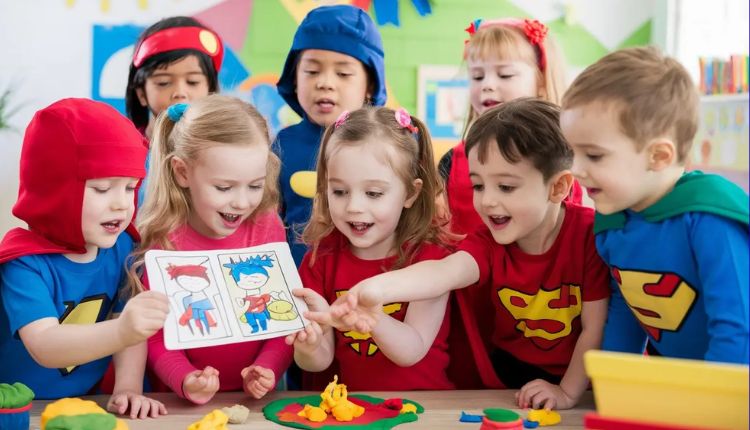Every parent dreams of their child growing up confident, capable, and ready to tackle whatever challenges life brings. The foundation for this bright future begins early, often before children even realize they’re learning. By focusing on the right skill-building activities and creating supportive environments, we can give our kids the tools they need to thrive.
The skills children develop during their swimming lesson for kids at Marsden Swim School formative years shape how they approach relationships, solve problems, and navigate the world around them. From communication and creativity to critical thinking and emotional intelligence, these abilities form the building blocks of a successful, fulfilling life. The question isn’t whether to invest in our children’s skill development—it’s how to do it most effectively.
The Power of Early Childhood Development
Research consistently shows that the early years are crucial for brain development. During this period, children’s minds are incredibly receptive to new experiences and learning opportunities. Neural connections form at a rapid pace, creating the framework for all future learning.
Children who receive quality early education and skill-building experiences demonstrate better academic performance, stronger social skills, and improved emotional regulation throughout their lives. These benefits extend far beyond childhood, influencing career success, relationship quality, and overall well-being in adulthood.
Essential Skills Every Child Needs
Communication and Language Skills
Strong communication abilities serve as the foundation for academic success and healthy relationships. Children who can express their thoughts clearly and listen effectively are better equipped to collaborate, resolve conflicts, and build meaningful connections with others.
Parents and educators can foster these skills through regular conversation, storytelling, and active listening. Reading together daily exposes children to rich vocabulary and narrative structure while creating positive associations with learning.
Problem-Solving and Critical Thinking
Teaching children to think critically and approach challenges systematically prepares them for complex decision-making later in life. These skills help kids become independent learners who can evaluate information, consider multiple perspectives, and develop creative solutions.
Simple activities like puzzles, building blocks, and age-appropriate science experiments encourage logical thinking and persistence. When children encounter difficulties, resist the urge to immediately provide solutions. Instead, ask guiding questions that help them work through problems independently.
Social and Emotional Intelligence
Understanding emotions—both their own and others’—enables children to navigate social situations successfully and maintain positive mental health. Kids with strong emotional intelligence show greater empathy, better self-control, and more resilience when facing setbacks.
Role-playing games, discussing feelings openly, and modeling appropriate emotional responses help children develop these crucial abilities. Creating safe spaces where children can express emotions without judgment builds confidence and emotional awareness.
Creativity and Innovation
Creative thinking skills enable children to approach problems from unique angles and adapt to changing circumstances. In our rapidly evolving world, the ability to think outside conventional boundaries becomes increasingly valuable.
Art projects, imaginative play, music, and open-ended exploration activities all nurture creativity. Avoid over-structuring creative time—children often produce their most innovative ideas when given freedom to experiment and explore.
Creating Supportive Learning Environments
Home Environment
The home environment significantly impacts a child’s development. Consistent routines provide security while designated learning spaces encourage focused exploration. Limiting screen time and providing diverse learning materials—books, art supplies, building materials, and educational games—creates opportunities for varied skill development.
Family involvement remains crucial. When parents actively participate in learning activities and show enthusiasm for discovery, children internalize the value of continuous learning.
Educational Settings
Quality educational programs complement home learning by providing structured skill-building opportunities and social interaction with peers. A well-designed preschool in Kaysville or any other community should offer balanced curricula that address cognitive, social, emotional, and physical development.
Look for programs that emphasize hands-on learning, encourage curiosity, and provide individualized attention. Experienced educators understand how to challenge children appropriately while building confidence and independence.
Practical Strategies for Skill Building
Age-Appropriate Activities
Tailor activities to your child’s developmental stage and interests. Toddlers benefit from sensory exploration and simple cause-and-effect activities, while preschoolers can handle more complex projects requiring planning and sustained attention.
Remember that learning happens through play. Games that seem purely recreational often develop important skills—board games teach strategy and patience, outdoor play builds physical coordination and risk assessment, and pretend play enhances language and social skills.
Encouraging Growth Mindset
Help children understand that abilities can be developed through effort and practice. Praise specific efforts and strategies rather than innate talent. When children encounter difficulties, frame them as learning opportunities rather than failures.
This mindset encourages persistence, reduces fear of challenges, and builds resilience—qualities that serve children throughout their lives.
Building Tomorrow’s Leaders Today
Investing in children’s skill development creates ripple effects that extend far beyond individual success. Children who develop strong foundational skills become contributing members of society, innovative problem-solvers, and compassionate leaders.
The journey of helping kids build skills for a bright tomorrow requires patience, consistency, and faith in their potential. By providing rich learning experiences, emotional support, and opportunities for growth, we equip children with the tools they need to create meaningful, successful lives.
Start today by observing your child’s interests and strengths, then look for opportunities to build upon them. Whether through structured educational programs like quality preschool programs or simple daily interactions at home, every moment offers potential for growth. Your investment in their development today shapes the leaders, innovators, and caring individuals they’ll become tomorrow.






